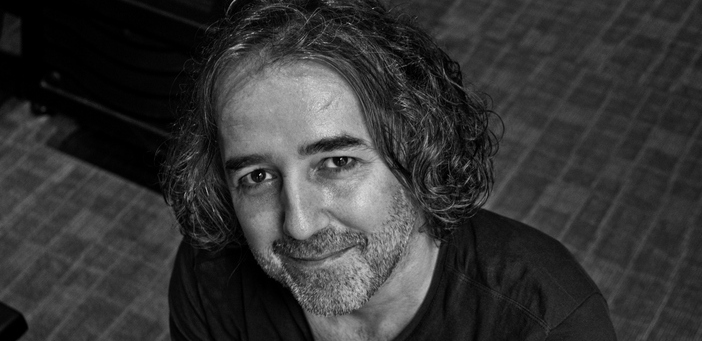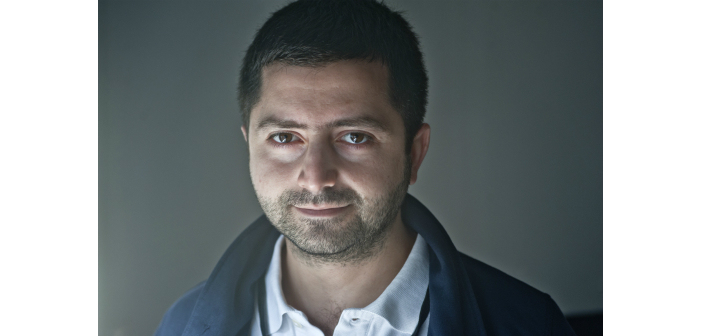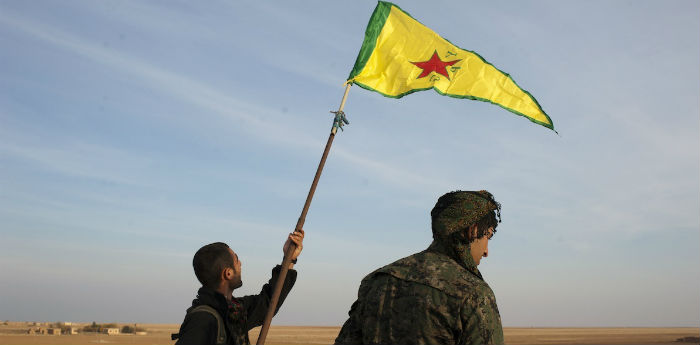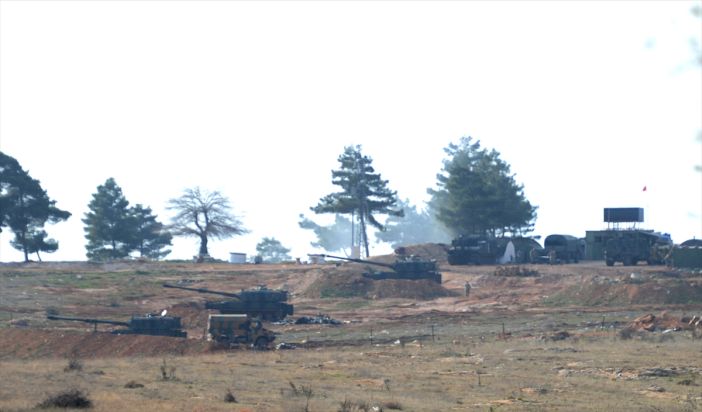We talked to Fehim Taştekin about the recent developments in Syrian Civil War, based on his recently published book “Rojava: The Time of Kurds" (Kürtlerin Zamanı).
Journalist Fehim Taştekin's book “Rojava: The Time
of Kurds" is published in Turkey. In the introduction of the
book, which is written as a follow-up of his book on Syria published
last year, Taştekin writes: “When I finished 'Suriye: Yıkıl Git,
Diren Kal' [his previous book on Syria], I noted that I couldn't give
Kurds their due and I am owed to them. I am a witness of a critical
period; I was carried out by sensitivity pertaining to journalists..
I couldn't be indifferent and I wanted to write it down. For at least
being able to say I saw, I listened to and I wrote."
Soon after the book was published, it is deemed as a criminal evidence. Last week, during the police raids to the houses of dissident unionist teachers, 24 teachers have been detained and 7 of them are arrested. In the house of one of the detained teachers, Taştekin's book was founded and recorded as a "criminal evidence".
Taştekin, after writing the historical process in Rojava from the fall of Ottoman Empire to this day, examines the political and social model established Rojava, consisting of Afrin, Kobani and Jazira cantons. We talked to Fehim Taştekin about the recent developments in Syrian Civil War, based on his book.
As you stated in your book, canton-based government in Rojava gained legitimacy in Syria and in the world as well. How was this legitimacy and prestige gained?
This legitimacy is based on some historical and geographical facts. First of all, Rojava is a fragmented territory; it is not uniform as Iraqi Kurdistan. Though Afrin and Kobani cantons are mostly populated by Kurds, Jazire has a pluralistic structure with Kurds, Arabs, Turkmen, Chechens and Christians with different ethnicity. As a historical fact, the population is always in motion. Armenians and Syriacs deported from Turkey in 1915 and the Kurds deported later had been settled in these lands. Kobani is such a place. That is why it is a very politicized region. Against this historical backdrop, Arabs, Kurds and Christians have had serious problems with each other. I mean; history, territory and the political atmosphere are all fragile. We see that clans in Rojava, especially the Arabic clans, have been getting along with the Syrian government from the old. Syriacs also consider their future as tied to Syrian state. With the massacres happened in post-Ottoman period, Syriacs turned a new page in Syria. This new page is precious for all Syriacs. Though their ethnic and cultural rights haven't been legally secured under Esad rule, they have been protected as a religious minority group. Moreover, they have been living under better conditions compared to Turkey or other Middle Eastern countries. At the end of this period, when a group like ISIS, which is determined to annihilate them, emerged, they were expected to turn to Damascus, which is what they are doing. And in the outside framework, there is Turkey. Considering PYD and YPG as branches of PKK, Turkey sees Rojava as a threat to itself. In Rojava, there are Chechen people, who were settled in the region during Ottoman times as a balancing factor in the face of Armenian and Kurdish population. Also, there are Turkmen, who can be manipulated by Turkey. You have to consider all these sensitive factors and the relations with Damascus government. Though they seem like disadvantages, there are two important factors that turn them into advantages.
What are those advantages?
Firstly, PYD and YPG have been trying to keep the war off the cities from the beginning. They said, “We won't fight against Syrian army and we won't let Jihadist group enter our cities.” Thanks to this strategy, they were able to build a rather stable daily life, while other regions in Syria turned to hell. In this sheltered area, Christians, Turkmens and Arabs were protected. This security-based motivation opened a few doors for Kurds and PYD. A structure founded by Öcalan affected Syrian Kurds ideologically and politically. And they managed to take over the government during the war.
Secondly, they said, “We don't fight against Esad regime; we don't seek for independence; we are establishing a new model that reflects our culture.” They formed assemblies and communes. During this period, a co-existence model had emerged, which was sometimes opposed by Kurds. With the the system of co-chairs, Syriacs and Arabs are included in the government. For instance, if the prime minister is Kurdish, then the deputy is selected from Syriacs. If the minister of defence is Kurdish, then deputy is selected from Chechens. On the economic level, a new economic model based on collective voluntary work is formed, which is like a shot in the arm under the conditions of war. Arabs and Syriacs are also included in the security forces. In the end, a participatory model in economy, politics and security is emerged. Under the conditions of war, its alternative is plunder, raid and warlords. Preventing the rise of warlords is very important. Warlords monopolize economy, security, humanitarian aids and everything. They don't let it happen in Rojava. This is really significant. Control mechanisms have been used very well, when there are mistakes or setbacks. Making this happen in a region like Jazire, where Kurds are not the majority and Arabs, Kurds, Syriacs and other people live together, is not that easy. Some people even call it revolution.
Do you think that this is a revolution?
This is a really revolutionary idea and initiative, but Rojava model has important challenges ahead. These challenges should be reminded and the government should be warned.
What are those challenges?
Currently, Rojava government and the US are forming an alliance. This development brings both advantages and disadvantages. The advantage is that this alliance plays an important role in strengthening the international legitimacy of Rojava model. This is an important factor given Turkey's propaganda against it. YPG has an office in Czech Republic. There is YPG flag in European Parliament. On the other hand, the US is an actor that generally has ulterior motives. They might try to use this alliance in different ways. They might try to pit the military powers in Rojava against Syrian army. This is a risk. If the relations with the US gets stronger, this might prevent the gains of Kurds in Rojava from becoming permanently institutionalized.
Why?
The US and the Syrian government have been enemies long before the war. Everybody knows that the US wants to bring the Syrian government down. Damascus regime might consider Rojava as an enemy, if they form strong relations with the US. And this would upset the balances in Rojava. For Arabs and Syriacs, who don't want to break with the regime, this would be unacceptable. It should also be kept in mind that Syria and Syrianness is an important identity, though lately it has been belittled in the international arena. Arabs and Syriacs would prefer belonging to Syria rather than a Kurdish government acting like back-up power of the US. I am not talking about the regime here; I am talking about the idea of Syria and Syrian identity. This identity became a unifying one. Syriacs and Arabs are aware of this fact. If Kurds refuse to accept this, the historical conflicts between Kurds and Syriacs-Arabs would be remembered. On the other hand, if Rojava would expand its territory, new settlements might have serious adaptation problems. For instance, the US insists on an operation in Raqqa, but PYD acts with deliberation, because it wouldn't be easy to apply Rojava model to Raqqa, even if ISIS is wiped off.
Relations with Turkey constitute another challenge, right?
Right, Turkey stepped in with a different game plan. The US is stuck and Russia created a space; Turkey is using these developments very well and creating a space for itself in Syria. However, Turkey is doing this against Kurds. The steps aiming to destroy Kurds' gains create resistance in Rojava. No one in Rojava would say, “You are rescuing us from YPG, welcome.” On the other hand, Turkey managed to turn some of Turkmen against YPG. I mean, Turkey's presence forces Rojava government to make mistakes. For instance, they hit at Kobani from the border, expecting YPG to hit back. YPG is trying not fall into this trap, but what will happen next constitutes a risk of course.
What is the situation of Christians in Rojava?
Kurds and PYD made some mistakes, which divided Syriacs. While some of them acted in concert with Damascus government, some of them took side with YPG. In fact, Syriacs siding with YPG is not a new development. PYD, as a movement that doesn't assume the sins of Turkish state and Kurdish clans, has advantages in forming relations with Christians. This factor is capable of bringing Kurds and Christians together and must be strengthened. This should be done with an approach inclined to cooperation and solidarity. You can hear Kurds saying: “We pay the price, we die for these land,s but Christian neighborhoods are getting empty; they go to Europe or Lebanon. They should come here and help us fighting.” They place the immigrants to Christians' abandoned neighborhoods and houses. Given the current reasons, this might seem reasonable, but if you consider historical memory, they should act more carefully and meticulously. If you say, “I have an army consisting of 50,000 people, I protect these lands”, you cannot create a new model. However, PYD is a movement willing to face with its mistakes and self-criticize. For instance, if you want to turn an abandoned school into a military position, you need to get consent from the owner. You cannot to do it by force. The key concept here is “consent”. For Christians, it is important to preserve their differences as far as possible. Esad regime bestowed religious rights to Christians, but didn't bestowed sufficient rights in terms of ethnic-cultural identity. These rights must be bestowed as well. For instance, there is the issue of textbooks that will be used by Syriacs. Kurds, Syriacs and Arabs would tell the story of Rojava differently. However, Syriacs must be the ones who decide what will be written in their textbooks. Some things must be more than symbolic. For instance, appointing a Syriac as a parliamentary speaker is important, but this cannot be only a symbolic appointment. Carrying the structures that are formed during the war with the help of the exterior pressure to the time of peace is very important. If you manage to transfer this model to the time of peace, then you can talk about Rojava Revolution.
“Turkey's military intervention is not enough to dissolve canton model”
Peace process is out of question for now, but do you think that it can be reconsidered in accordance with the developments in Syria and Rojava?
AKP government is willing to use its margins to the end both in domestic politics and Syria. This means that the clash will go on. The government doesn't think about starting negotiations, until the clash is no longer an option. We hear that there are meetings behind closed doors, but it seems impossible that this meetings will turn into negotiations in the short run. The government wants to weaken HDP in its region by consolidating the conservative circles and increasing the votes. In order to achieve this, they try to criminalize HDP as far as possible. Government knows very well that the clash cannot be the solution. Also, they certainly don't want Kurds see Rojava as an inspiration and an example. They try to stop US support to Rojava, start dissolution and turn Rojava into a domestic problem of Syria, because they don't want Kurds to say, “We don't accept anything less than Rojava model”, when the negotiations are started again. Before the negotiation process, Turkey wishes to get whatever it can through military intervention. However, this won't be a great achievement. Turkey's military intervention is not enough to dissolve canton model. It would take a major war and Turkey cannot be the winner at the end. In Kobani and Afrin cantons, PYD has an important social support, which cannot be destroyed by a war. I think that Erdoğan will turn to negotiation process, after maintaining the clashes for a while. However, this won't happen in near future.






